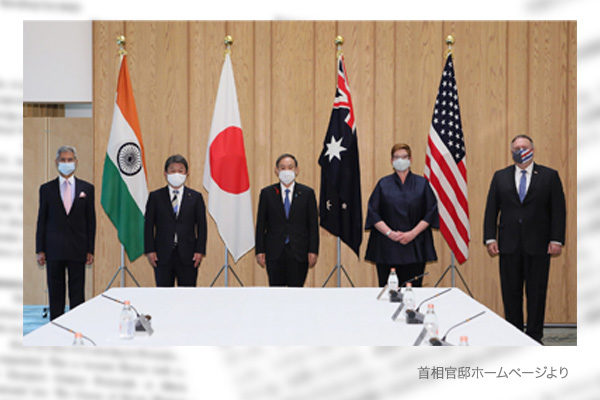A recent movement towards building a new security framework in the Indo-Pacific by the loose quadrilateral security dialogue among Japan, the United States, Australia and India is welcome because China, challenging the U.S.-led international order, has repeated blatant intrusions into territories of neighboring countries and punitive diplomacy against them. The quadrilateral foreign ministers at their meeting in Tokyo on October 6 agreed to regularize the ministerial dialogue and expand their cooperation with other countries to develop a Quad-plus framework. As the U.S. has already launched efforts to get united with like-minded countries to counter China, I hope to see the framework developing into an Indo-Pacific alliance to deter China’s vast military power.
Quad agreed to expand dialogue partners
“The existing international order is challenged,” said Japanese Foreign Minister Toshimitsu Motegi, who took the chair of the meeting, with an eye on China. “The novel coronavirus pandemic has added fuel to the challenge.” The remark came as China’s Xi Jinping regime was growing violent to conceal the weakness of the country as the origin of the pandemic and losing self-control.
China’s typical intrusion into foreign territories took place at the disputed border with India. Since Chinese and Indian forces clashed in June, a total of 100,000 troops from both sides still retain their face-off. In the South China Sea, China has advanced the militarization of artificial islands and intimidated Vietnamese and Malaysian ships. In the East China Sea, China has frequently intruded into Japan’s territorial waters around the Senkaku Islands of Okinawa Prefecture. Meanwhile China launches punitive diplomacy against foreign countries it doesn’t like. In retaliation of Australia’s call for investigations into the source of the novel coronavirus, China has imposed economic sanctions on barley and other Australian farm products. Asserting that China has become the largest trading partner for 130 economies in the world, it thoroughly intimidates any country challenging China.
To counter China’s territorial intrusion and punitive diplomacy, countries around China must be united to impose costs on China by excluding the country from supply chains in preparation for a contingency. China’s menace has naturally led India and Australia to get closer after years of being afraid of China’s attitude. Indian and Australian militaries concluded an acquisition and cross-servicing agreement in June, contributing to strengthening the Quad framework.
New regional security framework
China may have been bewildered to see its expansionism triggering the Quad unity. On news that Chinese Foreign Minister Wang Yi would visit Japan for talks with Prime Minister Suga and other Japanese leaders, a Chinese Foreign Ministry spokesperson refrained from clarifying whether China has offered the visit. China might be concerned that the U.S. would take leadership in developing a new regional security framework including Vietnam, New Zealand, Indonesia, and even Taiwan.
North Atlantic Treaty Organization had been able to face off with Soviet military forces because countries being afraid of the Soviet Union had been united. Similarly in the Indo-Pacific region, countries being afraid of China now have leeway to be united. Indonesia has sent a diplomatic notice to the United Nations secretary general on Chinese government ships’ undue intrusion into waters around the Natuna Islands, while Malaysia has clarified its plan to expand its continental shelf to counter China. The two countries and other coastal members of the Association of Southeast Asian Nations are eligible to join a Quad-plus framework. A freedom alliance would never surrender to the Chinese Communist Party.
Hiroshi Yuasa is a Planning Committee member and a senior fellow at the Japan Institute for National Fundamentals. He is a columnist for the Sankei Shimbun newspaper.


